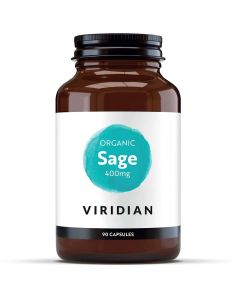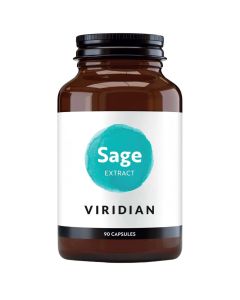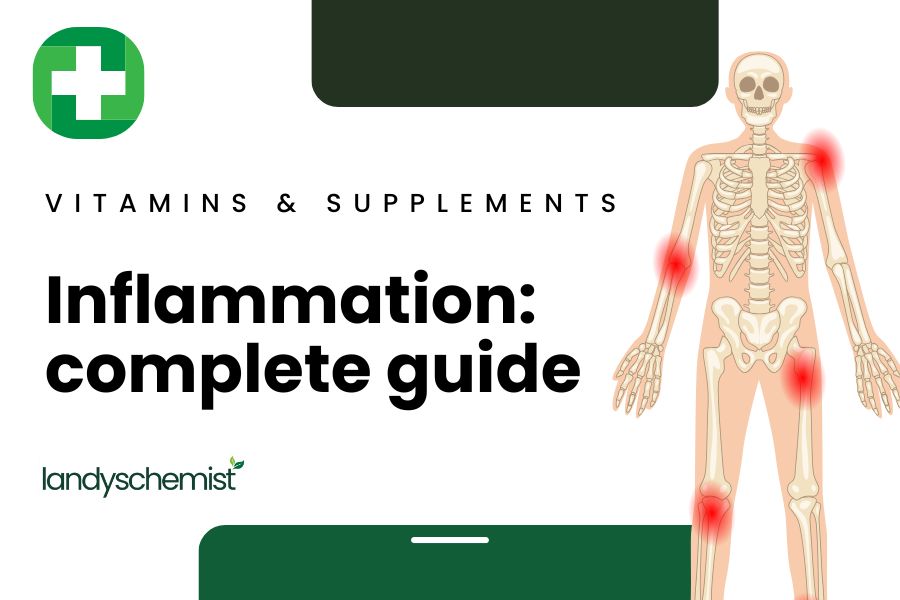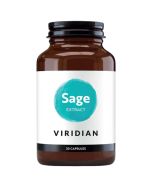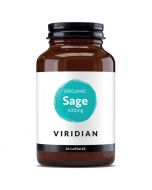
Benefits of Sage for Menopause: Hot Flushes, Brain Fog, and Mood
The menopause is a transitional period women go through, marking the end of their reproductive cycle. This is usually marked after the absence of a period after 12 consecutive months, to which women then enter menopause which can last between 7 to 14 years[1].
During the menopause, women can experience up to 34 symptoms that can interfere with their health and wellbeing, making it a difficult period of time. The most common symptoms include depression, mood swings, changes in skin conditions, difficulty sleeping, anxiety, and hot flushes to name a few.
Read More: Menopause 101: Everything You Need To Know
Sage for Menopause Symptoms
Sage, also known as Salvia officinalis, is an aromatic herb that can be used as a traditional herbal remedy to support women's health in numerous ways and even reduce the frequency and severity of menopause symptoms such as hot flushes, night sweats, brain fog, and mood changes.

Does Sage help with menopause symptoms?
Yes, sage can be an effective herbal treatment to relieve common menopause symptoms. Sage supplements have become one of the top herbal supplements in the midst of searching for ways to relieve menopausal symptoms due to it’s:
- Phytoestrogenic effects[2]: Sage contains compounds that act similarly to estrogen, the hormone that decreases during menopause[3]. These phytoestrogens can mimic estrogen in the body and help balance hormone levels to reduce symptoms.
- Thermoregulatory effects[4]: During the menopause, a decline in estrogen levels can increase body temperature, however sage has been found to potentially help regulate a normal internal body temperature.
- Antioxidant properties: Sage is high in antioxidant compounds[5,6], playing a key role protecting the body from oxidative stress[7].
- Anti-inflammatory effects: Menopause is associated with increased inflammation[8] due to a decline in estrogen, which can cause cell damage during the menopause, heightening damage arteries, organs, and joints.
Key Benefits of Sage Supplements for Menopause:
Supplementing with sage can help to alleviate multiple symptoms of the menopause such as:
Reduction in hot flushes and night sweats
Sage is thought to alleviate hot flushes and night sweats primarily due to its phytoestrogen content. These plant-based compounds mimic estrogen in the body, helping to balance hormone levels which helps to regulate the body's thermoregulatory processes. This action helps to reduce both the severity and frequency of hot flushes and night sweats[9]. A study found that the number of intensity-related hot flushes in menopausal women decreased by 50% within 4 weeks when taking fresh sage leaf daily[10]. Therefore, sage leaf may be an effective treatment to reduce excessive sweating and body temperature.
Reduction in brain fog
A review found that sage contains active compounds which influence biological processes[11]. This may support cognitive function such as memory and focus, and also reduce the risk of neurodegenerative disease. Furthermore, the phytoestrogen properties of sage can be linked to neuroprotective effects[12] and acetylcholinesterase Inhibition (an enzyme that breaks down acetylcholine—a crucial neurotransmitter for brain function) [13]. This shows that sage can be particularly helpful in minimising the effects of menopausal brain fog and improving brain health.
Mood swings
A study on 66 women experiencing menopausal symptoms, found that a 300mg dose of sage helped to improve depression, nervousness, and anxiety scores after 3 months[14]. The inhibition of acetylcholinesterase, has also been linked to reducing feelings of anxiety, and improving calmness, alertness, and contentedness[13]. These findings suggest that sage leaf can be an effective treatment for menopausal women suffering from mood swings or low mood.
How much sage should you take during menopause?
Multiple findings show that a daily dose of 300 - 1200 mg sage is enough to reduce menopausal symptoms.
Can you take sage alongside hormone replacement therapy (HRT)?
Yes, generally sage is safe to take alongside hormone replacement therapy (HRT) as it can help to reduce symptoms of the menopause if HRT is not working effectively enough. Some women may find sage as a useful alternative to HRT.
Recommendations
We recommend taking sage supplements that provide the ideal, but flexible dosage for supporting menopause, especially when considering taking sage alongside HRT. Here aer some of our top-quaity recommendations:
Side effects of sage leaf
Generally, sage has been shown to have minimal side effects, however with all supplements there can still be risks of common mild side effects such as headaches, dizziness, and it may have a sedative effect on some people.
Precautions
As sage mimics estrogen, we advise against usage in women with hormone-related cancers such as breast cancer. Furthermore, sage may lower blood sugar, interfering with medications for diabetes so it is important to speak to your healthcare advisor when considering sage supplementation.
References:
- https://www.nia.nih.gov/health/menopause/what-menopause
- https://www.sciencedirect.com/science/article/abs/pii/S0378874121008084
- https://www.ncbi.nlm.nih.gov/pmc/articles/PMC2717878/
- https://pubmed.ncbi.nlm.nih.gov/31196061/
- https://www.tandfonline.com/doi/full/10.2147/BTAT.S98610
- https://www.ncbi.nlm.nih.gov/pmc/articles/PMC8773343/
- https://www.ncbi.nlm.nih.gov/pmc/articles/PMC3952404/
- https://www.ncbi.nlm.nih.gov/pmc/articles/PMC8870346/
- https://www.ncbi.nlm.nih.gov/pmc/articles/PMC10363264/
- https://pubmed.ncbi.nlm.nih.gov/21630133/
- https://www.ncbi.nlm.nih.gov/pmc/articles/PMC5318325/
- https://pubmed.ncbi.nlm.nih.gov/24486046/
- https://pubmed.ncbi.nlm.nih.gov/16205785/
- https://pubmed.ncbi.nlm.nih.gov/32318472/
Disclaimer
This article is for informational purposes only and is not a substitute for medical advice. Consult your doctor or healthcare provider before starting any supplements, treatments, or remedies. Ensure a varied and balanced diet and a healthy lifestyle before considering supplements. Supplements should not replace a balanced diet.
By Rhysa Phommachanh

